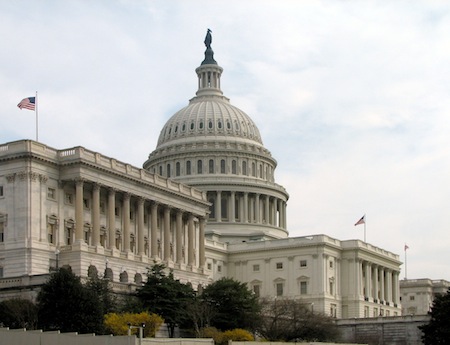House Passes Potential FCC Regulation-Blocking Bill

The smarter way to stay on top of broadcasting and cable industry. Sign up below
You are now subscribed
Your newsletter sign-up was successful
A just-passed House bill would make it easy for Congress to invalidate any last-minute regulations from an agency like the FCC or Federal Trade Commission with a single vote.
FCC chairman Tom Wheeler got clear signals from the GOP House and Senate leadership not to push through any "controversial" 11th hour regulatory efforts, which he acknowledged by pulling four of those items off the FCC's Nov. 17 agenda.
That came in letters from House Majority Leader Kevin McCarthy, joined by the chairs of all the House committees, and a separate letter from the leaders of the House Energy & Commerce and Senate Commerce Committees, which oversee the FCC.
But those items remain on circulation—meaning they could still be voted, just not in a public meeting—and Wheeler signaled he still had some hopes for them, as did former Democratic FCC chairman Mike Copps in an interview on C-SPAN's Communicators, who said he hoped the FCC's set-top box proposal could be dealt with "before this commission ends."
But the House on Thursday passed (240 to 179) a bill—H.R. 5982, the Midnight Rules Relief Act—to backstop those warnings to all federal agencies about 11th-hour votes, on or off a public meeting. The bill can't get a Senate vote until at least Nov. 28 since the Senate is not holding any business sessions until that date given the Thanksgiving holiday next week.
The bill "amends the Congressional Review Act to allow Congress to consider a joint resolution to disapprove multiple regulations that federal agencies have submitted for congressional review within the last 60 legislative days of a session of Congress during the final year of a President's term. Congress may disapprove a group of such regulations together (i.e., 'en bloc') instead of the current procedure of considering only one regulation at a time."
The bill would apply to the FCC and Federal Trade Commission, according to a spokesperson for Rep. Darrell Issa (R-Calif.) who introduced the bill, as well as federal agencies like the Department of Agriculture, FDA and EPA.
The smarter way to stay on top of broadcasting and cable industry. Sign up below
If passed by the Senate, it would have to wait until President-elect Donald Trump was sworn in to be submitted for a presidential signature since the current President has already signaled it would be vetoed. The Executive Office of the President said the "arbitrary packaging of rules for an up-or-down vote, as this bill does, is unnecessary."
But the Issa spokesperson said they expected they could get the bill signed quickly by the new President.
Contributing editor John Eggerton has been an editor and/or writer on media regulation, legislation and policy for over four decades, including covering the FCC, FTC, Congress, the major media trade associations, and the federal courts. In addition to Multichannel News and Broadcasting + Cable, his work has appeared in Radio World, TV Technology, TV Fax, This Week in Consumer Electronics, Variety and the Encyclopedia Britannica.

